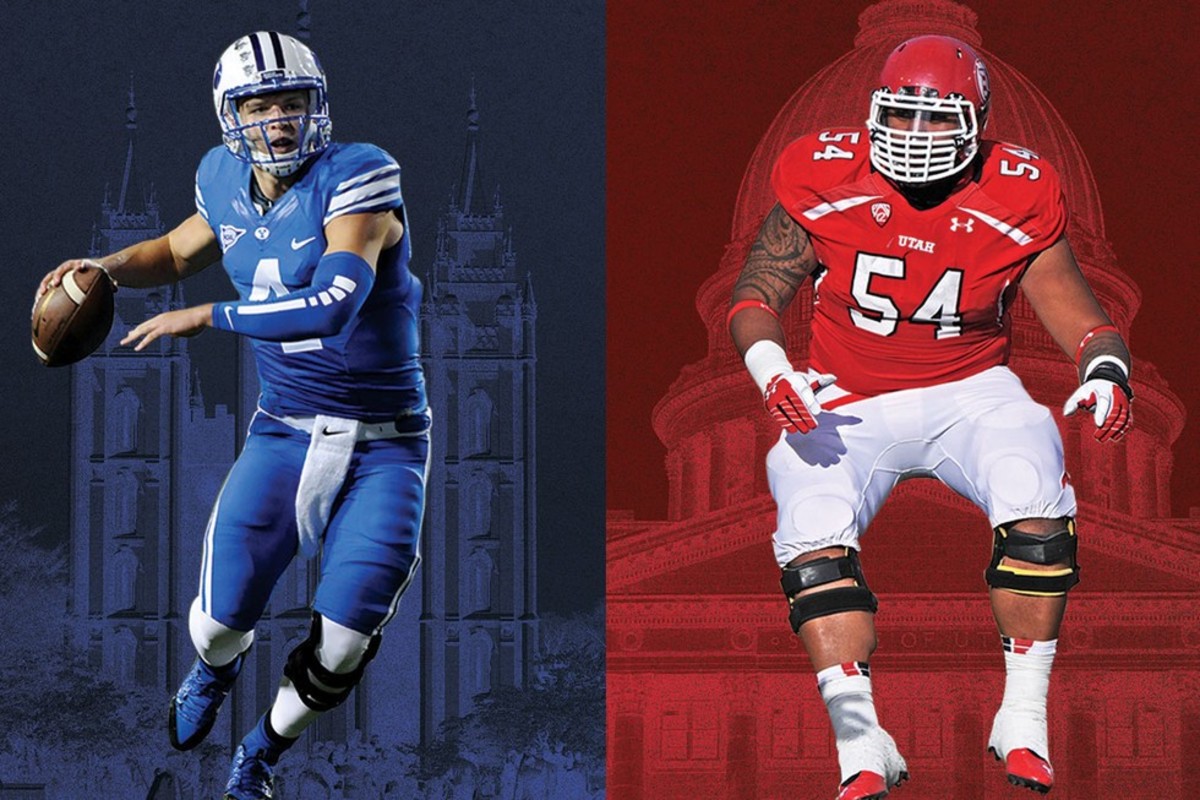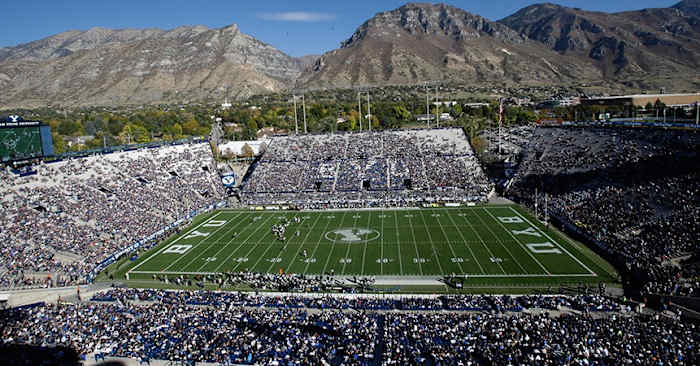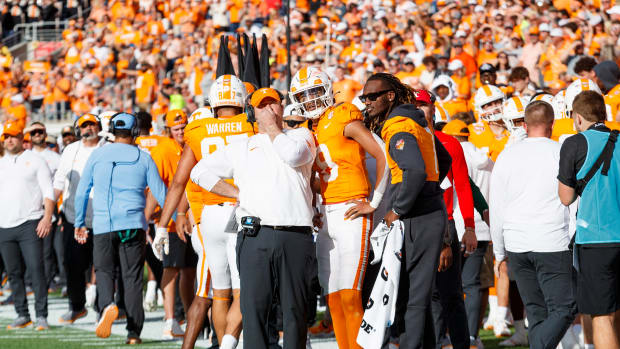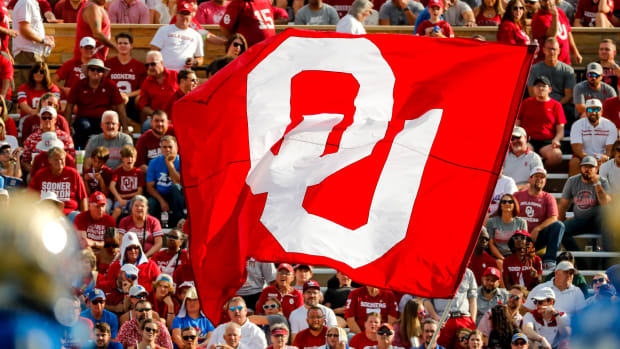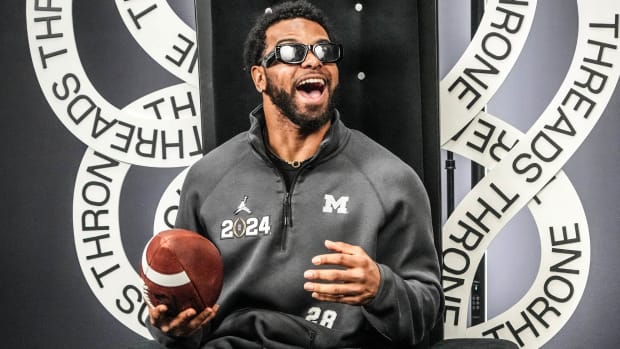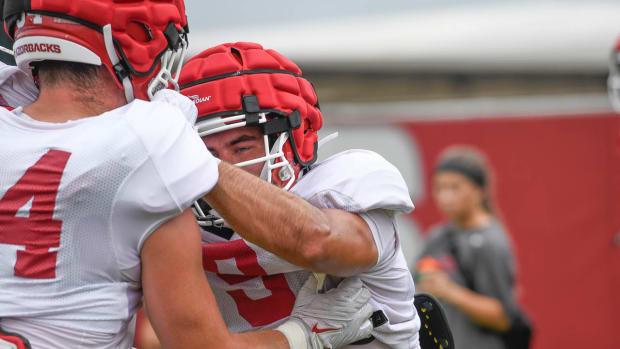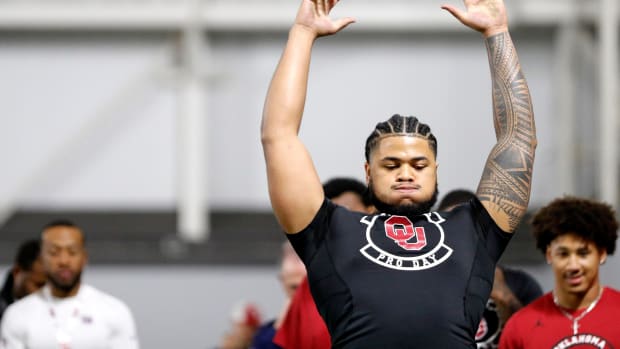Return of The Holy War: What the renewal of The Utah-BYU football rivalry means for the Utes, Cougars
\n
PROVO, Utah — He knows when he says it out loud that it sounds crazy, and as a result, Taysom Hill has to laugh. And it's not just crazy, it's a cold, hard fact: In all the time he's been at BYU, the senior quarterback has never beaten the Cougars' in-state rival, the University of Utah.
This seems impossible, because the 26-year-old has been a part of college football for what feels like forever. But when he breaks it down, it makes more sense: A 2008 (yes, it really was that long ago) graduate of Highland High in Pocatello, Idaho, Hill moved to Sydney, Australia for his two-year mission, a rite of passage for all young men who belong to the Church of Jesus Christ of Latter-day Saints.
Originally a Stanford commit, Hill missed the 2009, '10 and '11 seasons. By the time he returned to the states, he decided BYU was a better fit. He played his freshman ('12) and sophomore ('13) seasons, losing to the Utes 24–21 and 20–13. Then he suffered a season-ending injury midway through his junior campaign, fracturing his right leg and tearing a ligament (Utah and BYU did not play that year). Last season, in what was supposed to be his final year in Provo, Hill suffered a season-ending Lisfranc injury in BYU's first game, at Nebraska and had to watch when the teams got matched up in the Las Vegas Bowl that Utah won 35–28.
Hill applied for and was awarded a medical redshirt, which is how he got here, sitting outside the BYU football offices on Monday talking about how he relishes one more opportunity to defeat the Utes.
The teams meet Saturday night at Utah. For decades, they played each other in the final game of the season but because they're no longer in the same conference, it has to be earlier. That maybe dulls the rivalry a bit. There's a different game next week, which means there's no time to gloat about a victory or wallow in defeat.
But it's still BYU-Utah and that still means something, particularly to a player like Hill, who doesn't want to spend the rest of his life knowing he never beat the Utes.
"Before my mission, I narrowed it down to Stanford and BYU. Both programs allowed me to be part of something bigger than myself: Stanford, with their academics, and then the religious aspect of BYU, being able to represent the 'Y' was really appealing," says Hill. "So all those things factored in but … BYU's rivalry with Utah, there was nothing like it. As a kid growing up, you dream of playing something like this."
*****
A few notes on the so-called "Holy War:" First, no one really likes that nickname and factually, it's incorrect. After all, only one of them is a faith-based institution, or holy, anyway. Just ask former Cougars receiver Austin Collie, who corralled a pass on 4th-and-18 that set up BYU's game-winning drive in 2007. "Obviously, if you do what's right on and off the field, I think the Lord steps in and plays a part in it," Collie said following the Cougars' 17–10 victory. "Magic happens."
Can you tell this rivalry is a little heated?
Even the Church vs. State concept, while clever and more accurate, isn't entirely true. While the church owns and operates BYU, there are plenty of LDS players on Utah's roster. The notion that it's Mormons vs. the World is a stretch, too.
First-year BYU head coach Kalani Sitake says the difference between this rivalry and the others that he's been a part of is that BYU-Utah divides families. Sitake spent the 2015 season as defensive coordinator at Oregon State, and was surprised to learn that in Corvallis, lines are very clearly drawn about whether to root for the Beavers or the Ducks. But in the Beehive State, there's a lot of mixing and matching.
In Utah there is no professional football team, which makes the BYU-Utah game "the biggest event in the state, no matter what," according to Utes coach Kyle Whittingham. Fans say the Jazz could make the NBA Finals, and it wouldn't matter as much as Utah-BYU. And yes, you have to pick a side.
Sitake is a BYU grad who, before Oregon State, spent 10 years as a Utah assistant. He considers Utah coach Kyle Whittingham one of his mentors, and a close friend. Sitake's three children have yet to pledge their undivided loyalty to either team. Last week Sitake's 6-year-old son KK arrived at the dinner table in a red Utah football shirt. Sitake tells this story with a smile, shrug and simple explanation. KK's favorite colors are red, orange and blue.
"This rivalry was set before I was born," says Sitake, who is just 40. "We've gotta keep it up. But the thing I tell our kids is, we exist in the same community as Utah players. And we have to be about our people first."
Sometimes those people can't handle the other school, though. Isaac Asiata grew up 10 minutes from BYU's campus, in Spanish Fork, Utah, but always wanted to play for the Utes. "I looked at Utah and was like, man, these are tough dudes. I want to be a tough dude like that." On the playground in elementary school, Asiata remembers re-enacting epic BYU-Utah games with his friends during recess. Everyone took turns playing both teams but offense was always Utah and defense was always BYU. If you wanted to switch sides, you had to switch teams.
BAUMGAERTNER: The best games to watch in Week 2
"You're a little kid in the stands, and you might be getting into a fight with your best friend because you love Utah and he loves BYU," Asiata says. "Taysom is right: You grow up dreaming of playing in that game."
Not everyone took kindly to his decision on what side he wanted to be on in that game, though: When Asiata committed to Utah, a disgruntled BYU fan spray painted a Cougar "Y" on his mom's car.
Players and coaches try to downplay the supposed hatred between the schools, insisting that there's more to like than dislike about each other. After all, many of the coaches on each side previously worked or played at the other university. Everyone, and everything, is intertwined: Guys who grew up locally went to high school together and often serve in the same church wards. There's also something to be said that even if it's stereotyping, Mormons are, as a whole, usually pretty nice, right?
Well, most the time. Then there's Max Hall, circa 2009. The former BYU quarterback made headlines after the Cougars 26–23 overtime win in Provo when he told reporters: "I don't like Utah. In fact, I hate them. I hate everything about them. I hate their program. I hate their fans. I hate everything. So, it feels good to send those guys home."
Delighted with the jab, Utah fans responded by printing and distributing "MAX HALL HATES ME" t-shirts. They are still available for purchase online for $18, plus shipping.
*****
There are differing opinions on if the rivalry is as hate-filled as it once was.
"I don't think it's like it used to be," says former Cougars coach LaVell Edwards, who coached in 29 Utah-BYU contests. "Back 15-20 years ago, the coaches didn't particularly like each other, the townfolk didn't … It's a strange rivalry. Utah won for a long time, then we came in and won for about 20 years and the last 10 years, it's been pretty even."
A legendary coach praised for his innovative offense, the 85-year-old Edwards still lives in Provo, on a hill overlooking BYU's campus and the stadium that bears his name. In 29 years running the Cougars program, Edwards had just one losing season and won a staggering 69.3% of his games. In 1984, he led BYU to a perfect record (13–0) and the national title. He went 22–7 against Utah.
Edwards retired after the 2000 season. His last game is one of the legendary chapters in the rivalry, a 34–27 win on a quarterback run with current BYU coach Sitake as lead blocker.
Edwards pays close attention to the program. After the Cougars' 18–16 win over Arizona last week, he said he barely slept, tossing and turning with adrenaline like he had coached. He left Sitake, his protégé, a long message Sunday morning saying there was no better way to be "baptized into a season" than the type of game that gets your heart rate up. He told Sitake he was proud of the way he handled himself, and that he got emotional watching Sitake celebrate. When Sitake plays it in his office Monday morning, tears well up in his eyes.
Sitake says Edwards is the one who taught him to hold a deep respect for the rivalry, and what it means to the communities, while showing it's O.K. to be friends with your opponent when the game is over. Sitake often witnessed Edwards and Ron McBride, Utah's coach from 1990–2002, chatting and hugging before and after kickoff, a friendship that continues some 20 years later. Edwards and McBride still talk every week, on Friday afternoons, in Salt Lake, on their joint two-hour radio show.
Some Utah fans do not appreciate this camaraderie. While McBride was responsible for five of the Utes' wins during Edwards's iconic run—going 5–6 against his dear friend—many consider McBride's successor, Urban Meyer, the one who brought pride back to the rivalry.
Now the head coach at Ohio State and the winner of three national championships over his coaching career, Meyer has long been considered a master motivator. While in Salt Lake City, there were stories of Meyer distributing urinal cakes with the BYU logo throughout campus bathrooms, and refusing to say the letters B-Y-U out loud. Meyer went 2–0 against the Cougars, both memorable contests. In 2003 the Utes, who went 10-2 that season, shut out the Cougars 3–0. Current Utah coach Whittingham, a BYU grad and defensive junkie, calls this is his all-time favorite game in the rivalry. Utah thumped BYU the next year, winning 52–21. The Utes went on to complete a perfect season, winning the 2005 Fiesta Bowl.
Meyer left for Florida after compiling a 22–2 record. His motivational tactics not only worked, they had lasting effects. Utah quarterback Alex Smith, the No. 1 pick in the 2005 draft, didn't hold back when asked about beating his rival. "I really hate them," Smith said in 2004. "Playing in the game helped me understand: They are the most arrogant people. It's the whole church and state thing. They're the 'good kids.' We're the 'bad kids.' I didn't feel it in my gut last year like I do now."
There's a long, documented history of barbs traded over the rivalry's 120-year span. In his 13th year as head coach, Whittingham doesn't really engage; he insists it's just like any other game week, and training doesn't change.
"If there was a better way to prepare, we wouldn't just save it for BYU!" he says, rolling his eyes. That being said, in his weekly press conference, Whittingham looked befuddled when asked if he rooted for BYU in all its other games. "Uh, not really."
The teams have met 96 times. Utah holds a 58-34-4 edge and has won five in a row. Between 1922 and 2013, the schools missed just four meetings. When the teams didn't play in 2014, it marked the first time since World War II that the rivalry went silent. In '14 and '15, Utah opted to skip out on "the school down South" in favor of a home-and-home with college football powerhouse Michigan. Scheduling, Whittingham says, is "circumstantial." There aren't a lot of non-conference slots because the Pac-12 plays a nine-game league schedule and Whittingham has to do "what's best for the program." In 2014 and '15, that meant playing the Wolverines. "I don't think it's a crushing blow to take a year off" from the rivalry, he said.
Predictably, there was backlash from the respective rabid fanbases, with many who pledge allegiance to BYU livid that Whittingham and Utah would dare consider themselves too good to play their former conference opponent. The rivalry turned out to be unavoidable, anyway. BYU and Utah met last year in the Las Vegas Bowl.
A year away didn't deter the passion. When a few players were suddenly suspended before the game, enraged fans blamed the other school. An official at one of the schools confirmed that an athletic staffer even received death threats in the wake of player dismissals.
*****
On Tuesday morning of rivalry week, a warm breeze blows around the Utah football offices as students traipse through the freshly cut grass, toting instruments on their way into the Utah Field House. It's time for marching band practice.
A football staffer flips on the giant fans overhead—a necessity when 170-plus people crowd into the indoor practice facility to practice parading in unison—as Josh Tolman, an 18-year-old freshman studying kinesiology, talks about his first BYU-Utah rivalry game.
A native of Burley, Idaho, Tolman has all the required facts going into the weekend: "I know we hate each other, basically," he says, adding that he's part of a divided family, with cousins going to both schools, and says this time of year his home is, "sort of like a madhouse." Tolman says that last week, before Utah's season opener against Southern Utah, marching band director Dr. Brian Sproul exhorted his students. "We have to get all this down!" he cried. "BYU is the game that matters, and it's next week!" (Sproul disputes this, waving his hands in front of him and insisting "every game is important.")
Tolman is asked what he knows about the BYU band, does he have any friends there or are the Cougars particularly good at playing musical instruments? He pauses. "Just from being here," he says confidently, "I think I'm supposed to say they suck."
***
There's chatter that the rivalry might be coming to a close in the near future. The Pac-12 has tried to play up the "Rumble in the Rockies," Utah's annual game against Colorado, as the two conference newcomers are naturally positioned to be each other's rival. Whittingham appreciates this but says that rivalries can't be "manufactured," just like how almost 100 years of history can't be forgotten.
But purposeful or not, BYU and Utah have distanced themselves from one another since each moved out of the Mountain West. Now an independent, BYU might soon face the same struggles of Gonzaga basketball: No one wants to play the non-Power Five school that could beat you because you have nothing to gain. You're supposed to beat the little guy. Lose and your reputation could suffer.
Edwards says one of his proudest accomplishments is how the state of Utah, which is sparsely populated compared to football juggernauts like Texas, California and Florida, is known for its football. And it's tough to win here. Over the last 40 seasons BYU has won 80.3 percent of its home games, 9th-best in FBS football. The only school out west with a better winning percentage is Boise State, at 86.3, which ranks second. Utah, by comparison, ranks 32nd, winning 68.7 percent of its home contests.
No one knows what the rivalry, let alone college football as a whole, will look like in 10 years. BYU and Utah are scheduled to play each other through 2020 and after that, it's anyone's guess. Hill says it doesn't matter if they're on each other's schedules or not: BYU vs. Utah has staying power.
"I can promise you this," Hill says, "it will always be a rivalry." And he's confident people will keep coming back for it—fans, coaches and players alike.
